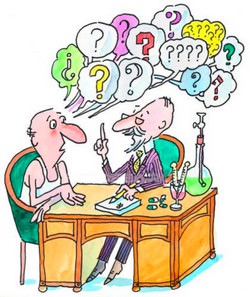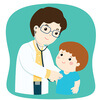Information about his health is patient’s right excluding certain modifiable scenarios. This right is retained by the attendant of the patients as well. Most often the root of all trouble lies in the failed communication and inability of the doctor or medical personal to build a sense of transparency and confidence in them.
Doctors are as human as the patients. They have to undergo lot of thinking, study, investigations and consultations, specially when the patient has a complicated disease or an unexpected course. The study process is never ending and the developments in this field are infinite. That’s why they have segregated into smaller super and sub specialty because knowing everything is impossible. Doctors work hard on their patients, stress their brains, grey their hair on the cases and they expect people to understand their dedications and not just blame them for the course of illness.
Patient on the other hand are sometimes too superstitious, they come with a belief that the hospital means a cure to any illness and that so within days. A fraction of them are so suspicious of every activity going around that the stress level goes higher than that caused by the illness itself. The right thing is to believe in the treating team and co-operate them and make things easier and smooth. Many of times when things get complicated, it does not happen.
So, what can link these both side’s expectations? How can we feel this vacuum?
It’s the Communication. The precious gift to organism which starts with micro-organisms and end in humans. Communication is not just a gift but a skill.
Patient counselling and the consent
It is as important to counsel a patient, as it is to treat him/her. ‘Consent” is one thing we often disregard, and ignoring it means we are not respecting their presence. Often we may need just verbal consent to as far as written informed consent for risky procedures and proper counselling of the procedures. “Consent” in Medical profession is given so much priority in the Developed world, and it has a strong link with the medical ethics.

A proper focus on patient counselling can solve lot of unnecessary hassle we have been facing as a medical personnel. We can always discuss our diagnosis, what we have thought, what we are doing and what we have planned for the patient, with a confidence, necessary level of assurance, with courteousness and a warm smile. Being informed and confident will help to heal much of the patient’s worries, queries and doubts.
This can prevent lot of consequences. Once you have a good rapport with the patient, it becomes a good professional relationship. The patient will trust you, follow you happily and even when the course goes wrong patient can understand things.
Consent and Counselling- Are we lacking them in our practice? Lets begin it right from our medical education and develop a good skill in these parts, and show as much focus as in them as we do in our Clinical skills.

MD Pediatrics and Fellowship Neonatology, he chooses to stay anonymous. He often writes his views online as well as share few important topics for medical students, doctors and specially parents. He does research in pediatrics.
